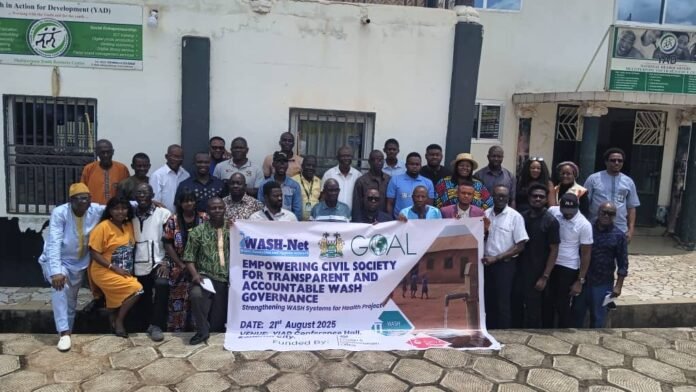Bo-22nd August 2025-The Water, Sanitation and Hygiene Network (WASH-Net) on Thursday, August 21, 2025, launched a two-day training for Civil Society Organizations (CSOs) on advocacy, governance, and budget accountability in the WASH sector. The training, held at the YIAD Conference Hall in Kenema, brought together CSOs, Development and Planning Officers, and District Budget Oversight Committees from six districts.
The objective of the training is to build the capacity of both national and local CSOs to lead evidence-based advocacy for increased budget allocation to WASH services. Organizers emphasized that stronger governance and improved transparency in the WASH sector will contribute directly to health system strengthening and better public health outcomes in Sierra Leone.
In his opening remarks, WASH-Net Program Manager, Peter Senesie, highlighted the importance of equipping CSOs and local government actors with the right tools to strengthen WASH systems.
“This training is designed to enhance knowledge, improve transparency, and build accountability within the sector,” he said. “Beyond technology, learning remains a critical capacity. With the right skills, participants will be better positioned to analyze WASH policies, track budgets, monitor gaps, and draft advocacy action plans.”
Senesie added that while the training was originally designed for CSOs, the participation of Development and Planning Officers was vital, given their role in shaping local governance and service delivery.
Lead facilitator Cherinor Bah explained that budget tracking and monitoring are key to ensuring that WASH resources are effectively allocated and utilized. He outlined the government’s budget cycle—formulation, approval, execution, and evaluation while stressing the role of CSOs in monitoring expenditure trends and pushing for greater transparency.
“Budget tracking helps us follow the money. It ensures that funds allocated for water and sanitation actually reach the communities that need them,” Bah said. He pointed to the Ministry of Finance, Ministry of Health, Ministry of Water Resources, local councils, and civil society as central actors in the process.
Presenting on the health impacts of unsafe WASH services, Dalton John shared alarming statistics. “In 2019, 69 percent of all diarrhoea-related deaths were linked to unsafe WASH services,” he said. “Poor hand hygiene was connected to 356,000 deaths from acute respiratory infections, and in total, 1.4 million deaths annually are caused by diseases linked to unsafe water, sanitation, and hygiene.”
WASH-Net CEO, Musa Ansumana Soko, further guided participants on analyzing government budgets. He distinguished between allocations, releases, and expenditures, emphasizing that true accountability lies in tracking not just what is promised, but what is actually delivered.
“Budget allocation is what is planned, budget release is what is made available, and expenditure is what is actually spent,” he explained. “Understanding these differences is key to holding institutions accountable.”
Welcoming participants, WASH-Net’s District Focal Person in Kenema, Edward A. Kai, urged them to see the training as an opportunity to confront Sierra Leone’s WASH challenges head-on.
“These discussions go beyond Kenema. They speak to the urgent WASH issues facing the entire country,” Kai said. “We must work collectively to address gaps in access and governance if we are to achieve lasting solutions.”
The training concluded with district and national advocacy action plans aimed at influencing policy, increasing budget allocations, and improving service delivery in WASH.
To climax the event, each district was asks to development a comprehensive advocacy work plan around the FY 2025/2026. However, below are the key action points that require immediate attention and intervention from the two day training.
- Advocacy and Awareness
- District Budget Engagement: WASHNET to support district teams to print and place banners with WASH advocacy messages at all district councils. This will remind the councils of our WASH priorities and incorporate them into district and national plans
- position Paper: By Tuesday, August 26, 2025, WASH district structures must create a unified position paper or policy brief. This document will ensure a single, clear voice when engaging the Ministry of Finance, councils, and line ministries on WASH priorities, including policy, legislation, and finance
- Community Radio Task Shows : WASH district structures to commence monthly radio show to increase awareness of WASH issues and encourage community participation in budget planning
- Diistrict Advocacy Plan and Strategy: National and district WASH Focal Persons to lead in the drafting and submission of district advocacy plan and strategy by August 28, 2025
- Coordination
- WhatsApp Forum: WASH district platforms to be regularly updating the WhatsApp group with district-level WASH issues, plans, and engagements
- Monthly District Coordination: District WASH leads to be holding monthly meetings to coordinate on WASH issues and priorities, ensuring effective advocacy.
- #WASHNet #GoodGovernance #WaterJustice #Accountability #CivilSociety #CommunityPower #GlobalDev #SDG6 #WaterCrisis #Sanitation




